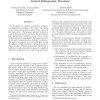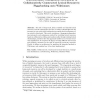120
click to vote
ICDIM
2009
IEEE
14 years 12 months ago
2009
IEEE
In this paper, we introduce a method for categorizing digital items according to their topic, only relying on the document's metadata, such as author name and title informati...
103
Voted
EMNLP
2009
14 years 12 months ago
2009
In this paper, we address the issue of automatic extending lexical resources by exploiting existing knowledge repositories. In particular, we deal with the new task of linking Fra...
134
click to vote
EMNLP
2009
14 years 12 months ago
2009
Polarity lexicons have been a valuable resource for sentiment analysis and opinion mining. There are a number of such lexical resources available, but it is often suboptimal to us...
121
click to vote
TAL
2010
Springer
14 years 12 months ago
2010
Springer
The lack of large-scale, freely available and durable lexical resources, and the consequences for NLP, is widely acknowledged but the attempts to cope with usual bottlenecks preven...
CORR
2000
Springer
15 years 1 months ago
2000
Springer
This paper describes a new method, COMBI-BOOTSTRAP, to exploit existing taggers and lexical resources for the annotation of corpora with new tagsets. COMBI-BOOTSTRAP uses existing...
121
click to vote
CORR
2004
Springer
15 years 1 months ago
2004
Springer
Lexical resources such as WordNet and the EDR electronic dictionary (EDR) have been used in several NLP tasks. Probably partly due to the fact that the EDR is not freely available...
100
click to vote
COLING
1992
15 years 3 months ago
1992
-- To date, no fully suitable data model for lexical databases has been proposed. As lexical databases have proliferated in multiple formats, there has been growing concern over th...
151
click to vote
TREC
2000
15 years 3 months ago
2000
CL Research's question-answering system (DIMAP-QA) for TREC-9 significantly extends its semantic relation triple (logical form) technology in which documents are fully parsed...
122
click to vote
NAACL
2003
15 years 3 months ago
2003
We report on our work to automatically build a corpus of instructional text annotated with lexical semantics information. We have coupled the parser LCFLEX with a lexicon and onto...
108
Voted
ACL
2006
15 years 3 months ago
2006
Thesauri and ontologies provide important value in facilitating access to digital archives by representing underlying principles of organization. Translation of such resources int...


